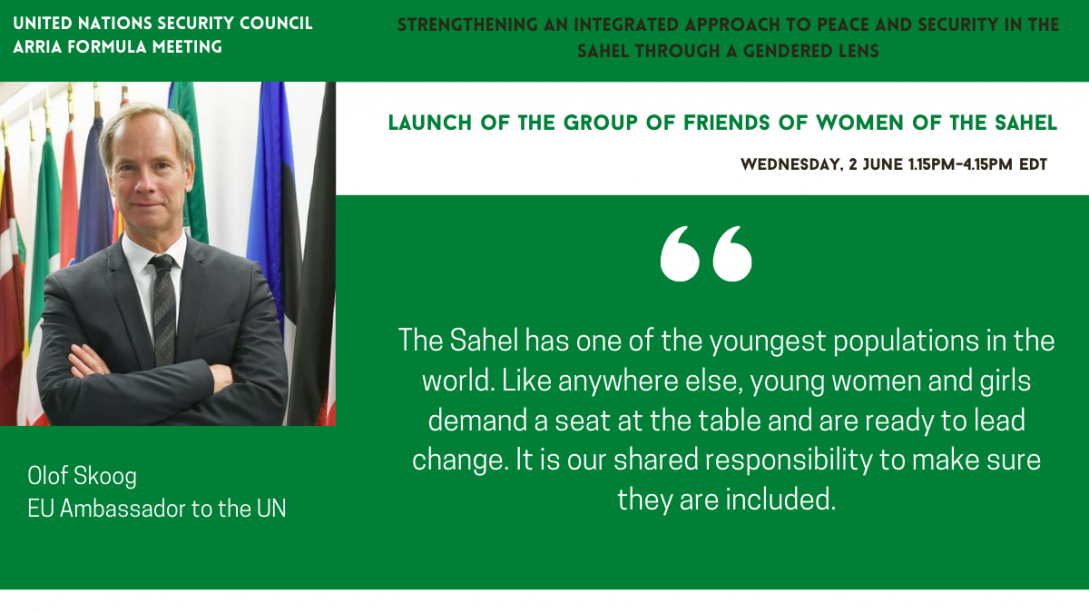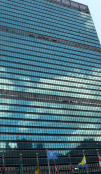Remarks by Ambassador Skoog at the UN Security Council Arria-formula Meeting to Launch the Group of Friends of Women of the Sahel

Excellencies, dear colleagues,
It is an honour to join Niger and the other Sahel countries, as well as the African Union, the G5 Sahel, the UN and the World Bank to launch today the new UN Group of Friends on Women of the Sahel.
This initiative is in line with our two continents’ commitment to promote multilateral approaches to complex issues and a concrete example of AU-EU-UN trilateral cooperation.
The Sahel faces a number of pressing issues. Due to ongoing conflicts, more than 7.2 million people have fled their homes, 23.4 million people are in need of emergency food assistance, and 2.5 million children under 5 are estimated to suffer from severe acute malnutrition. The EU stands with all those affected.
Over the past 7 years, the EU and its Member States have mobilised all instruments at their disposal to support stabilisation and development in the region, with an overall envelope of EUR 8.5 Billion. The newly adopted EU Integrated Strategy for the Sahel has reaffirmed this strategic partnership, while placing greater emphasis on the political and governance dimensions.
Human rights violations, inequalities, starting with gender inequalities, and impunity are fuelling the current crisis and jeopardizing the legitimacy of the States and their social contracts. To improve governance, a much more inclusive approach is needed, building on the potential and contributions of all people.
Women and girls are an undeniable driving force for development in the region. For example, women account for up to 80% of the workforce in agriculture, making them the backbones of food security and community resilience. Their essential role has increased as a result of the health crisis, with an increased unpaid workload.
Yet, women continue to be massively excluded from places where decisions are being made. The truth is that gender indicators in the Sahel remain very low, particularly when it comes to access to education, credit or production capacities. Women participation in political decision-making is still limited, despite strong commitments in this field. In the security sector, women only make up 0.35% of the G5 Sahel Joint Force and 6% of its Police Component. We welcome concerted efforts to increase the number of women in the security and defence structures of the G5 Sahel countries.
Not only does fragility negatively affect women’s rights, but gender inequalities in the Sahel also increase fragility. Most obviously, these inequalities contribute to flawed and unsustainable conflict prevention initiatives and continued under-development.
The Sahel requires international attention that takes gender equality seriously. Promoting women’s participation is not an add-on but a must. That is why, the EU has committed through its new Sahel strategy to “pay particular attention to gender equality and the role of women, especially in promoting peace-building and peace-keeping, better governance and sustainable development, in line with the Women, Peace and Security agenda.”
The EU and its Special Representative for the Sahel promote the inclusion of women in political and mediation processes, as in the Mali Peace Agreement Monitoring Committee. Through our Capacity Building (EUCAP) missions in Mali and Niger, we support trainings and awareness raising actions to support women’s representation and combat stereotypes. We cooperate closely with OHCHR to tackle the root causes of inequalities and ensure the protection of those at risk, particularly women human rights defenders and mediators. And we work with civil society and the UN through the Spotlight initiative to eliminate harmful practices.
Much more needs to be done. Today’s meeting and the creation of the new Group of Friends are an opportunity to highlight the potential of Sahelian women and girls and push for concrete action, starting with renewed attention within the Security Council.
The Sahel has one of the youngest populations in the world. Like anywhere else, young women and girls demand a seat at the table and are ready to lead change. It is our shared responsibility to make sure they are included. The creation of the Group of Friends is a concrete step in that direction.




